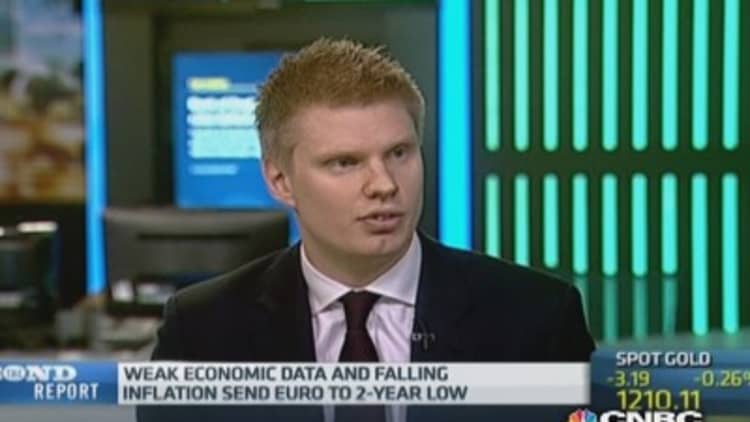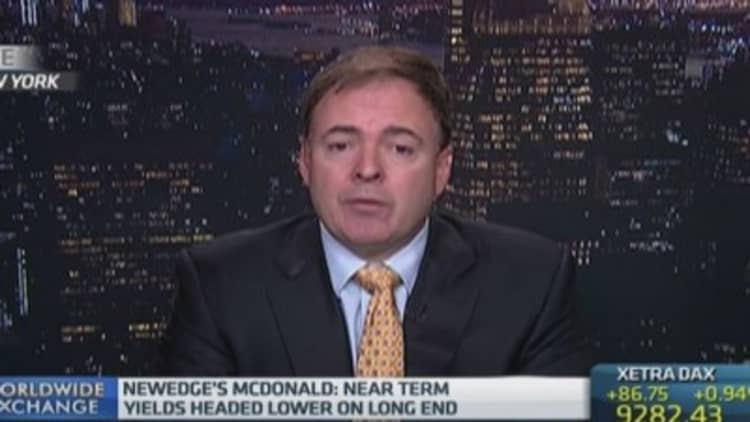
Even though interest rates in Europe are widely expected to stay in negative territory for a while, some analysts are still finding opportunities to find returns.
"We are now in an era where cash is negative so there will be a hunt for yield," Iain Stealey, fixed income fund manager at JPMorgan Asset Management, told CNBC last week.
Read MoreIs the long-expected high-yield selloff under way?
Widely held expectations interest rates in the euro zone aren't heading higher any time soon got a fillip last week after European Central Bank (ECB) President Mario Draghi gave more details of the bank's plans to purchase covered bonds and asset-backed securities (ABS).
The details came after the ECB kept interest rates at record lows and last month's surprise decision to cut the bank's main rate to a new low of 0.05 percent, while the rate on the marginal lending facility was also decreased and the rate on the deposit facility was cut further into negative territory.
"We've always had the mantra of don't fight the [Federal Reserve]. And I fully believe the mantra of don't fight the ECB," Stealey said. "It's really not a bad spot for high yield. High yield doesn't like recession. "
It isn't clear how much the broader market agrees with this assessment. Globally, funds have been flowing out of high-yield bonds, with around $6.15 billion leaving the segment's exchange-traded funds (ETFs) and mutual funds so far this year, according to data from Jefferies.
Read MoreAbout those forecasts for bonds to drop…
But while $2.84 billion has left developed Europe high-yield funds over the past three months, the segment has still seen a net $4.43 billion in new funds so far this year, the data show.
Nonetheless, investors remain cautious, keeping a weather eye on further central bank intervention on both sides of the Atlantic.
"In Europe and Japan, bond valuations look especially unattractive, but the likelihood of added central bank easing measures should also limit increases in bond yields," Sylvie Golay Markovich, head of fixed income analysis at Credit Suisse's private bank, said in a note last week, noting she expects euro-denominated high-yield bond prices will be supported in the short-term.
Read More This central bank may be calling bond yields for now
But she added that European high-yield bonds are susceptible to declines in bond prices in the U.S., where analysts generally expect the Federal Reserve to raise interest rates sometime next year.
Some are looking to other European assets for yield.

Societe Generale has upgraded its view on European real estate to overweight, citing expectations it will get a boost from low long-term bond yields and the sector's tendency to re-distribute more than 70 percent of its earnings.
"Real estate continues to offer a 4 percent yield, significantly higher than the equities market (3.2 percent), government bonds (1.0 percent in Germany) or the credit market (1.9 percent)," it said.
Read More Are risky European bonds in a bubble?
Credit Suisse's private bank also sees value in European properties - at least for Asian investors.
"European properties offer much more attractive rental yields than their home markets, with regional diversification benefits," it said, noting it believes the outlook for European commercial property is brightening.
"Outside cities like London, Paris, Stockholm or Munich, investment yields of Madrid (5.3 percent) and Dublin (5.5 percent) are far higher than net rental yields of prime offices in Hong Kong (2.85 percent), Singapore (3.45 percent) or Tokyo (3.5 percent)," it said.
— By CNBC's Leslie Shaffer. Follow her on Twitter: @LeslieShaffer1


